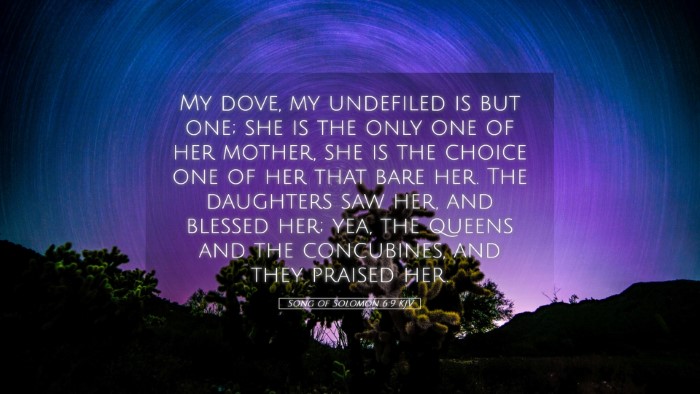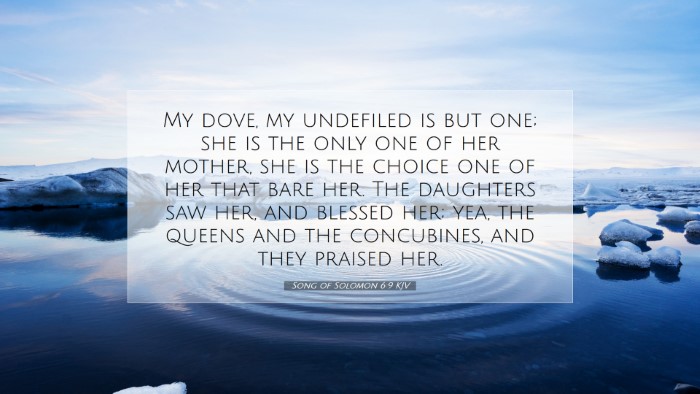Old Testament
Genesis Exodus Leviticus Numbers Deuteronomy Joshua Judges Ruth 1 Samuel 2 Samuel 1 Kings 2 Kings 1 Chronicles 2 Chronicles Ezra Nehemiah Esther Job Psalms Proverbs Ecclesiastes Song of Solomon Isaiah Jeremiah Lamentations Ezekiel Daniel Hosea Joel Amos Obadiah Jonah Micah Nahum Habakkuk Zephaniah Haggai Zechariah MalachiSong of Solomon 6:9
Song of Solomon 6:9 KJV
My dove, my undefiled is but one; she is the only one of her mother, she is the choice one of her that bare her. The daughters saw her, and blessed her; yea, the queens and the concubines, and they praised her.
Song of Solomon 6:9 Bible Commentary
Commentary on Song of Solomon 6:9
Verse: "My dove, my undefiled is but one; she is the only one of her mother; she is the choice one of her that bare her. The daughters saw her, and blessed her; yea, the queens and the concubines, and they praised her." (Song of Solomon 6:9)
Introduction
The Song of Solomon, attributed to King Solomon, is a poetic celebration of love. Chapter 6, verse 9 presents a profound insight into the uniqueness and beauty of the beloved within the context of divine love. This commentary seeks to explore the richness of this verse through the lenses of several public domain commentaries.
Interpretive Insights
1. The Undefiled Dove
According to Matthew Henry, the dove in this verse symbolizes purity and innocence. The term "undefiled" emphasizes the beloved’s chastity and moral purity. In a spiritual sense, the dove is analogous to the Holy Spirit, which conveys gentleness and peace. The beauty of the beloved is not just physical; it represents a character that is pleasing to God.
2. The Concept of Exclusivity
Albert Barnes notes the significance of the phrase "is but one." This exclusivity suggests a unique relationship that transcends mere affection. It implies that the beloved stands distinguished among all others, much like the church stands unique among the nations in its relationship with Christ. This theme of exclusivity reiterates the covenantal nature of love that is present throughout the scripture.
3. Her Maternal Lineage
Adam Clarke highlights the importance of the beloved’s genealogy. The phrase “she is the only one of her mother” suggests a lineage that sets her apart, illustrating that the beloved’s qualities are inherited and reflect a divine craft. This unique maternal legacy points to the notion that those called by God are chosen and blessed, creating a special bond between the beloved and the Divine.
Symbolism and Themes
1. Beauty and Praise
The reaction of "the daughters" who "saw her, and blessed her" illustrates the collective recognition of beauty and virtue. Both Matthew Henry and Albert Barnes underline the idea that true beauty, rooted in spiritual integrity, garners admiration and praise. This collective adoration reinforces the notion that the beloved’s divine qualities resonate beyond her personal experience to influence others.
2. Queens and Concubines
The later reference to "queens and concubines" further emphasizes the status and esteem in which the beloved is held. According to Matthew Henry, this indicates that even those in high standings recognize her worth. In the kingdom of God, those who are esteemed here on earth may not always understand the depth of spiritual beauty, but the awe and recognition from others amplify the significance of the beloved’s character.
Application and Reflection
- Uniqueness in Christ: As believers reflect on their identity in Christ, they should recognize their own uniqueness in the eyes of God, akin to the beloved in this passage.
- Promoting Purity: The emphasis on the “undefiled” prompts a call to uphold virtues of purity and holiness in relationships and spiritual life.
- Response of the Community: The communal praise of the beloved serves as a motivation for congregations to uplift one another, recognizing and celebrating spiritual achievements.
Conclusion
The Song of Solomon 6:9 highlights key themes of purity, uniqueness, and divine appreciation. Through commentaries from Matthew Henry, Albert Barnes, and Adam Clarke, we gain a multi-faceted understanding of the beloved and her relationship to God. Pastors, students, and theologians alike are invited to meditate on these attributes, allowing them to shape their understanding of divine love and inspire a deeper pursuit of holiness.


